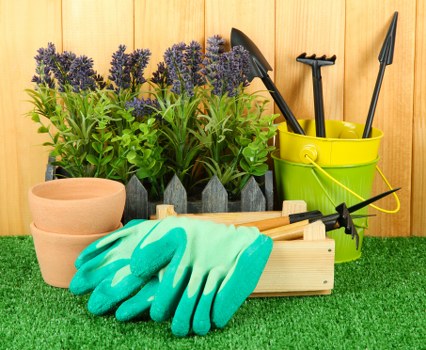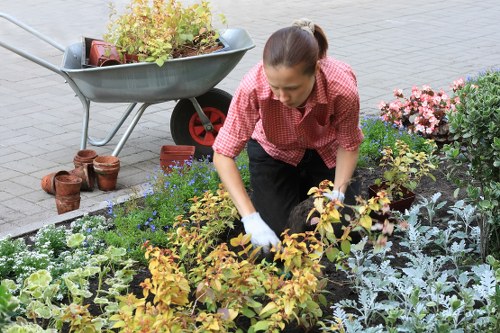Comprehensive Guide to Garden Maintenance in Newham

Maintaining a beautiful garden in Newham requires a blend of knowledge, dedication, and the right strategies. Whether you're a seasoned gardener or a novice, understanding the nuances of garden maintenance can transform your outdoor space into a vibrant and thriving haven.
Newham's unique climate and urban setting present both challenges and opportunities for garden enthusiasts. From managing seasonal changes to selecting the right plants, effective garden maintenance ensures that your garden remains healthy and aesthetically pleasing throughout the year.
In this comprehensive guide, we'll explore the essential aspects of garden maintenance in Newham, offering tips and insights to help you achieve and sustain a stunning garden.
Why Garden Maintenance Matters

Regular garden maintenance is crucial for several reasons. It not only enhances the visual appeal of your property but also promotes healthy plant growth and prevents potential issues such as pests and diseases. A well-maintained garden can also increase your property's value and provide a serene environment for relaxation and recreation.
Moreover, garden maintenance contributes to environmental sustainability. Proper care of plants can improve air quality, support local wildlife, and reduce the urban heat island effect, making Newham a greener and more pleasant place to live.
Neglecting garden maintenance, on the other hand, can lead to overgrown plants, invasive species, and unmanaged waste, which can be both unsightly and detrimental to the ecosystem. Therefore, investing time and resources into garden upkeep is a wise decision for any homeowner in Newham.
Essential Garden Maintenance Practices

Lawn Care
A lush, green lawn is often the centerpiece of any garden. Proper lawn care involves regular mowing, watering, and fertilizing. In Newham, it's important to choose grass varieties that are suited to the local climate to ensure resilience against drought and pests.
Mowing should be done at the right height to promote healthy growth. Avoid cutting the grass too short, as this can stress the plants and make them more susceptible to weeds. Additionally, aerating the lawn can improve soil health by allowing better air and water penetration.
Fertilizing your lawn in the spring and autumn can provide essential nutrients, supporting robust growth and vibrant color. It's also beneficial to overseed annually to fill in bare spots and maintain an even turf.
Pruning and Trimming

Maintaining Plant Health
Regular pruning and trimming are vital for the health and appearance of your plants. By removing dead or diseased branches, you can prevent the spread of infections and encourage new growth. Pruning also helps to shape plants, ensuring they grow in desirable forms and sizes.
Different plants require different pruning techniques. For instance, flowering shrubs may need to be pruned after they bloom, while fruit trees benefit from annual structure pruning. Understanding the specific needs of your plants is key to effective maintenance.
In Newham, where space can be limited, strategic pruning can also help manage the size of your plants, preventing them from becoming overgrown and encroaching on pathways or structures.
Pest and Disease Control

Protecting Your Garden
Pests and diseases can wreak havoc on your garden, leading to significant damage and loss of plant health. Implementing an integrated pest management (IPM) approach can help minimize these issues while reducing the need for chemical interventions.
IPM involves monitoring your garden for signs of pests and diseases, identifying the root causes, and applying appropriate control measures. This may include introducing beneficial insects, using organic pesticides, or adjusting cultural practices to create an environment less conducive to pests.
Preventative measures, such as maintaining plant health through proper watering and fertilization, can also reduce susceptibility to pests and diseases. Regular inspections and early intervention are crucial in managing these challenges effectively.
Seasonal Garden Maintenance

Spring
Spring is a critical time for garden maintenance in Newham. As the weather warms, it's essential to prepare your garden for the growing season. This includes clearing away any debris from winter, pruning perennials, and planting new flowers and vegetables.
Additionally, applying a balanced fertilizer can give your plants the nutrients they need to thrive. It's also a good time to check and repair garden tools and equipment to ensure they're ready for active use.
Spring is also ideal for sowing seeds and starting seedlings indoors, giving your plants a head start before transplanting them outdoors.
Summer Care

Managing Heat and Water
Summer brings longer days and warmer temperatures, requiring adjustments in garden maintenance practices. Regular watering is crucial to prevent plants from drying out, especially during heatwaves. Implementing efficient watering systems, such as drip irrigation, can help conserve water while ensuring plants receive adequate moisture.
Mulching around plants can also retain soil moisture, regulate soil temperature, and suppress weed growth. Additionally, providing shade for sensitive plants during the hottest parts of the day can protect them from sunburn and stress.
Summer is a prime time for harvesting mature vegetables and fruits, as well as deadheading flowers to encourage continuous blooming.
Autumn Preparation

Preparing for Cooler Months
As temperatures begin to drop, autumn is the perfect time to prepare your garden for the winter months. This includes clearing fallen leaves, which can harbor pests and diseases, and composting them to enrich your soil for the next growing season.
Planting autumn-blooming flowers can extend the beauty of your garden, while protecting tender plants with mulch or frost covers can prevent damage from early frosts.
It's also a good time to divide and transplant perennials, allowing them to establish strong root systems before the winter.
Winter Maintenance

Protecting Your Garden
Winter may seem like a dormant period for your garden, but maintenance tasks are still essential. Protecting delicate plants with mulch or burlap can shield them from harsh weather conditions, while pruning dormant trees and shrubs can prepare them for healthy growth in the spring.
Clearing snow and ice from pathways and garden structures ensures safety and accessibility. Additionally, storing garden tools and equipment in a dry place prevents rust and prolongs their lifespan.
Reflecting on the past year's garden performance and planning for the next season can help you implement improvements and set new gardening goals.
Benefits of Hiring Professional Garden Maintenance Services

Expertise and Efficiency
While DIY garden maintenance can be rewarding, hiring professional services in Newham offers numerous advantages. Professionals possess the expertise and experience to diagnose and address garden issues effectively, ensuring optimal plant health and aesthetic appeal.
They can also save you time and effort by handling tasks such as pruning, pest control, and lawn care with precision and efficiency. Additionally, professional gardeners stay updated on the latest gardening trends and techniques, bringing fresh ideas to your garden.
For those with busy schedules or limited gardening knowledge, professional maintenance services provide a reliable solution to maintain a beautiful and thriving garden year-round.
DIY vs. Professional Garden Maintenance

Making the Right Choice
Deciding between DIY and professional garden maintenance depends on various factors, including your gardening skills, time availability, and budget. DIY gardening offers the satisfaction of hands-on involvement and can be cost-effective, but it requires time, patience, and a learning curve.
On the other hand, professional services provide expert care and can handle complex tasks, allowing you to enjoy your garden without the associated workload. Assessing your personal circumstances and garden needs will help you determine the best approach.
In many cases, a combination of both DIY efforts and professional assistance can strike the perfect balance, allowing you to maintain control over certain aspects while outsourcing more demanding tasks.
Choosing the Right Garden Maintenance Service in Newham

Key Considerations
Selecting a reputable garden maintenance service is crucial for achieving the desired results. Here are key factors to consider:
- Experience and Expertise: Look for services with a proven track record and knowledgeable staff.
- **Range of Services:** Ensure they offer the specific maintenance tasks you require, such as lawn care, pruning, or pest control.
- **Customer Reviews:** Positive feedback from previous clients indicates reliability and quality workmanship.
- **Flexibility:** Choose a service that can tailor their offerings to meet your garden's unique needs.
- **Pricing:** Compare quotes to find a service that offers good value without compromising on quality.
By carefully evaluating these factors, you can select a garden maintenance service that aligns with your expectations and garden goals.
Tips for Maintaining a Beautiful Garden All Year Round

Consistent Care Practices
Maintaining a beautiful garden requires consistent care and attention throughout the year. Here are some essential tips:
- Regular Watering: Ensure your plants receive adequate water, especially during dry spells.
- Proper Fertilization: Provide essential nutrients to support plant growth and health.
- Weed Control: Remove weeds promptly to prevent competition for resources.
- Pruning and Trimming: Maintain the shape and size of plants to promote healthy growth.
- Soil Health: Test and amend soil as needed to create an optimal growing environment.
- Mulching: Apply mulch to retain moisture, regulate soil temperature, and suppress weeds.
- Pest Monitoring: Keep an eye out for signs of pests and address issues promptly.
- Plant Rotation: Rotate crops in vegetable gardens to prevent soil depletion and reduce pest buildup.
Implementing these practices can help you maintain a vibrant and thriving garden throughout the seasons.
Sustainable and Eco-Friendly Garden Maintenance Practices

Promoting Environmental Stewardship
Adopting sustainable and eco-friendly practices in garden maintenance benefits both your garden and the environment. Here are some strategies to consider:
- Composting: Recycle garden waste and kitchen scraps into nutrient-rich compost for soil enrichment.
- Water Conservation: Use rainwater harvesting systems and efficient irrigation methods to reduce water usage.
- Organic Gardening: Opt for organic fertilizers and pest control methods to minimize chemical impact.
- Native Plants: Incorporate native plant species that are well-adapted to the local environment and require less maintenance.
- Biodiversity: Encourage a diverse range of plants to support local wildlife and create a balanced ecosystem.
- Energy-Efficient Tools: Utilize manual or electric garden tools instead of gas-powered ones to reduce emissions.
Implementing these eco-friendly practices not only enhances the sustainability of your garden but also contributes to a healthier and greener Newham community.
Integrating Technology in Garden Maintenance

Modern Solutions for Efficient Care
Technology has revolutionized garden maintenance, offering innovative solutions to streamline tasks and enhance efficiency. Here are some technologies to consider integrating into your garden care routine:
- Smart Irrigation Systems: Automated systems that adjust watering schedules based on weather conditions and soil moisture levels.
- Garden Management Apps: Mobile applications that help you schedule maintenance tasks, track plant growth, and receive tips.
- Weather Stations: Localized weather monitoring to inform your gardening decisions and prepare for adverse conditions.
- Robotic Lawn Mowers: Automated mowers that maintain your lawn with minimal manual intervention.
- LED Grow Lights: Energy-efficient lighting options to support plant growth in shaded areas or indoor gardens.
By leveraging these technologies, you can enhance the precision and convenience of your garden maintenance practices, resulting in a healthier and more efficient garden.
Common Garden Maintenance Mistakes to Avoid

Ensuring Successful Garden Care
Avoiding common garden maintenance mistakes can save you time, effort, and resources. Here are some pitfalls to watch out for:
- Overwatering: Excessive watering can lead to root rot and other plant diseases. It's essential to monitor soil moisture and water plants only as needed.
- Underpruning: Failing to prune regularly can result in overgrown plants, reduced flowering, and increased vulnerability to pests.
- Ignoring Soil Health: Neglecting soil quality can hinder plant growth. Regularly testing and amending your soil ensures it remains fertile and well-structured.
- Using Incorrect Plant Varieties: Selecting plants that are not suited to Newham's climate can lead to poor growth and increased maintenance needs.
- Neglecting Pest Control: Ignoring early signs of pest infestations can allow problems to escalate, causing extensive damage to your garden.
- Improper Tool Maintenance: Dull or damaged tools can make maintenance tasks more challenging and less effective. Regularly sharpen and repair your tools to ensure optimal performance.
By being mindful of these common mistakes, you can enhance the health and beauty of your garden.
Enhancing Garden Aesthetics

Creating a Visually Pleasing Environment
Enhancing the aesthetics of your garden involves thoughtful design and strategic maintenance. Here are some tips to achieve a visually appealing garden:
- Color Coordination: Choose a color palette for your flowers and plants to create harmony and visual interest.
- Plant Variety: Incorporate a mix of plant types, heights, and textures to add depth and diversity to your garden.
- Pathways and Structures: Use pathways, garden beds, and structures like pergolas or benches to organize space and provide focal points.
- Lighting: Install garden lighting to highlight features and create ambiance during evening hours.
- Water Features: Adding fountains or ponds can bring tranquility and attract wildlife to your garden.
- Seasonal Planting: Plan for year-round interest by selecting plants that bloom in different seasons.
By implementing these strategies, you can create a garden that is not only beautiful but also a reflection of your personal style.
Winterizing Your Garden

Preparing for Cold Weather
Winterizing your garden involves preparing it to withstand the harsh conditions of the cold months. Here are steps to ensure your garden remains protected during winter:
- Mulching: Apply a thick layer of mulch around plants to insulate the soil and protect roots from freezing temperatures.
- Protecting Sensitive Plants: Use covers or frost blankets to shield delicate plants from frost and snow.
- Pruning: Prune dead or diseased branches to prevent damage from snow and ice accumulation.
- Cleaning Garden Tools: Remove debris and clean tools to prevent rust and prolong their lifespan.
- Storing Equipment: Store hoses, sprinklers, and other garden equipment in a dry, sheltered area to protect them from the elements.
- Planning for Next Year: Reflect on the past season's successes and challenges to plan improvements for the upcoming year.
By taking these steps, you can ensure that your garden emerges healthy and vibrant in the spring.
Gardening on a Budget

Cost-Effective Maintenance Strategies
Maintaining a beautiful garden doesn't have to break the bank. Here are some budget-friendly strategies to keep your garden in top shape:
- DIY Composting: Create your own compost from kitchen scraps and garden waste to enrich your soil without purchasing commercial fertilizers.
- Seed Saving: Save seeds from your favorite plants to reduce the cost of purchasing new seeds each season.
- Repurposing Materials: Use recycled materials to create garden structures, planters, or decorative elements.
- Bulk Purchasing: Buy seeds, fertilizers, and other supplies in bulk to take advantage of discounts and reduce costs.
- Plant Swaps: Participate in local plant swaps to exchange plants and cuttings with fellow gardeners.
- Efficient Watering: Implement water-saving techniques to reduce your water bill and promote sustainability.
These strategies can help you maintain a thriving garden while staying within your budget.
The Role of Soil Health in Garden Maintenance

Building Fertile Grounds
Soil health is fundamental to successful garden maintenance. Healthy soil provides the necessary nutrients and support for plant growth, while also promoting beneficial microbial activity. Here are ways to maintain and improve soil health:
- Soil Testing: Regularly test your soil to determine its pH levels and nutrient content, allowing you to make informed amendments.
- Organic Matter: Incorporate organic matter, such as compost or aged manure, to enhance soil structure and fertility.
- Cover Crops: Plant cover crops during off-seasons to prevent soil erosion, suppress weeds, and add nutrients.
- Crop Rotation: Rotate plant families to prevent soil depletion and reduce the risk of pests and diseases.
- Aeration: Aerate compacted soil to improve air exchange and water infiltration.
- Mulching: Apply mulch to retain moisture, regulate soil temperature, and add organic matter as it decomposes.
Maintaining healthy soil is a continuous process that lays the foundation for a robust and flourishing garden.
Incorporating Native Plants

Enhancing Local Biodiversity
Incorporating native plants into your garden is an excellent way to support local biodiversity and create a sustainable landscape. Native plants are well-adapted to the local climate and soil conditions, making them more resilient and low-maintenance.
Benefits of using native plants include:
- Pollinator Support: Native plants provide essential resources for local pollinators, such as bees and butterflies.
- Reduced Water Needs: Adapted to the local environment, native plants often require less irrigation.
- Pest Resistance: Native species are less susceptible to pests and diseases that might affect non-native plants.
- Enhanced Ecosystem: They contribute to the overall health and diversity of the local ecosystem.
- Cost-Effective: Their resilience reduces the need for extensive maintenance and inputs.
Integrating native plants can make your garden more sustainable and environmentally friendly while adding beauty and interest.
Creating a Year-Round Garden

Ensuring Continuous Interest
A year-round garden offers consistent beauty and interest, regardless of the season. Achieving this involves selecting a diverse range of plants that bloom or provide visual appeal at different times of the year.
- Spring: Bulbs like tulips and daffodils herald the arrival of spring with vibrant colors.
- Summer: Annuals and perennials provide continuous blooms and lush foliage during the warmer months.
- Autumn: Plants with striking fall foliage, such as maples and ornamental grasses, add warmth and texture.
- Winter: Evergreen shrubs, berries, and winter-hardy plants offer structure and interest even in the coldest months.
Additionally, incorporating elements like evergreen plants, bark mulch, and garden structures can maintain visual appeal throughout the year.
Utilizing Vertical Garden Techniques

Maximizing Space
Vertical gardening is an innovative approach to maximizing space, especially in urban areas like Newham where outdoor space may be limited. By growing plants vertically, you can create lush gardens even in small areas.
- Vertical Planters: Utilize wall-mounted planters or hanging baskets to grow herbs, flowers, and small vegetables.
- Trellises and Arbors: Support climbing plants like vines and roses, adding height and dimension to your garden.
- Living Walls: Create a green wall by installing a panel system that supports a variety of plants, providing a stunning focal point.
- Pallet Gardens: Repurpose wooden pallets to create tiered gardens for growing a mix of plants.
- Hanging Containers: Use hanging pots to add layers and interest to your garden space.
Vertical gardening not only optimizes space but also adds unique visual elements, making your garden more dynamic and engaging.
Implementing Sustainable Practices

Eco-Friendly Garden Maintenance
Sustainable practices in garden maintenance help preserve the environment and promote long-term garden health. Here are some eco-friendly strategies:
- Rainwater Harvesting: Collect and store rainwater for irrigation, reducing reliance on municipal water supplies.
- Organic Fertilizers: Use compost, manure, or organic-based fertilizers to nourish plants without harmful chemicals.
- Natural Pest Control: Employ biological controls, such as ladybugs for aphid management, instead of chemical pesticides.
- Energy Efficiency: Opt for solar-powered garden lights and energy-efficient tools to minimize energy consumption.
- Green Waste Recycling: Compost garden waste and recycle materials to reduce landfill contributions.
- Native Plant Selection: Choose plants that require minimal inputs and are adapted to the local climate.
Incorporating these sustainable practices not only benefits your garden but also contributes to the overall health of the environment in Newham.
Conclusion

Effective garden maintenance in Newham combines knowledge, planning, and consistent effort to create and sustain a beautiful outdoor space. Whether you opt for DIY methods or hire professional services, understanding the key aspects of garden care is essential for success.
From seasonal adjustments to sustainable practices, each element plays a vital role in maintaining a thriving garden. By implementing the strategies outlined in this guide, you can enjoy a vibrant and healthy garden all year round.
Contact us today to discover how our expert garden maintenance services can transform your Newham garden into a stunning oasis.

